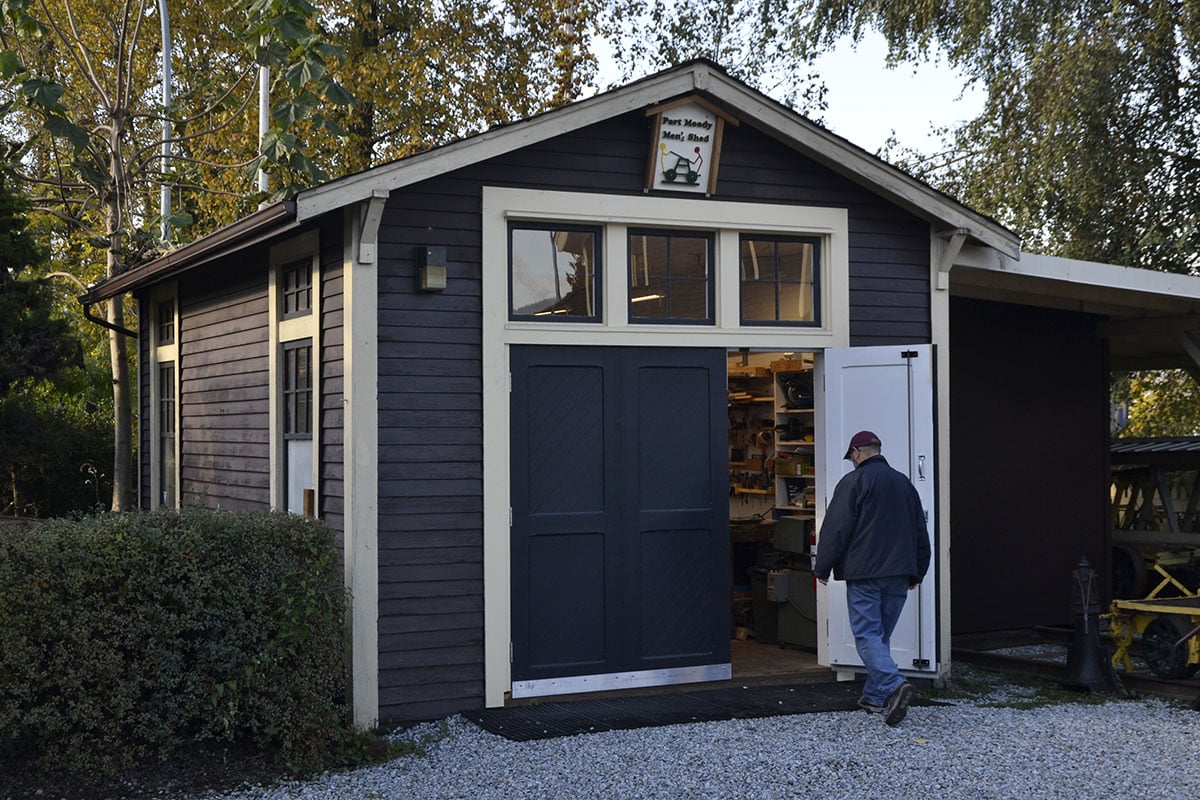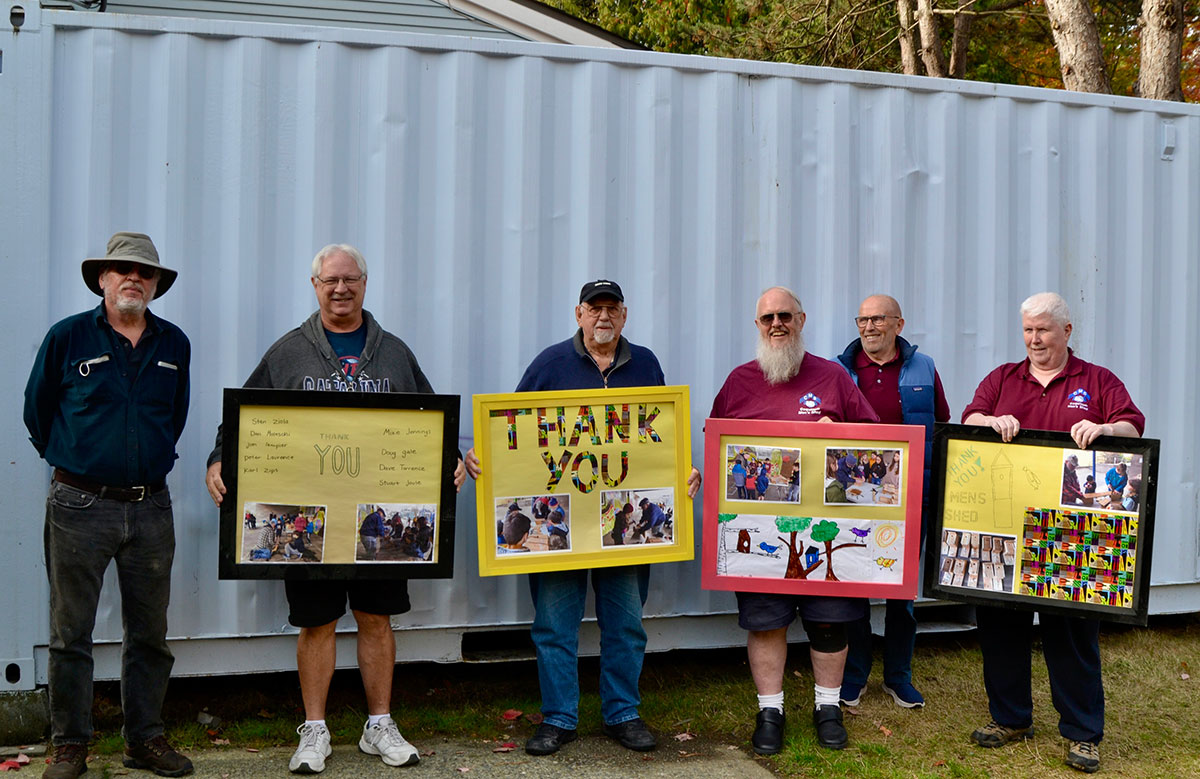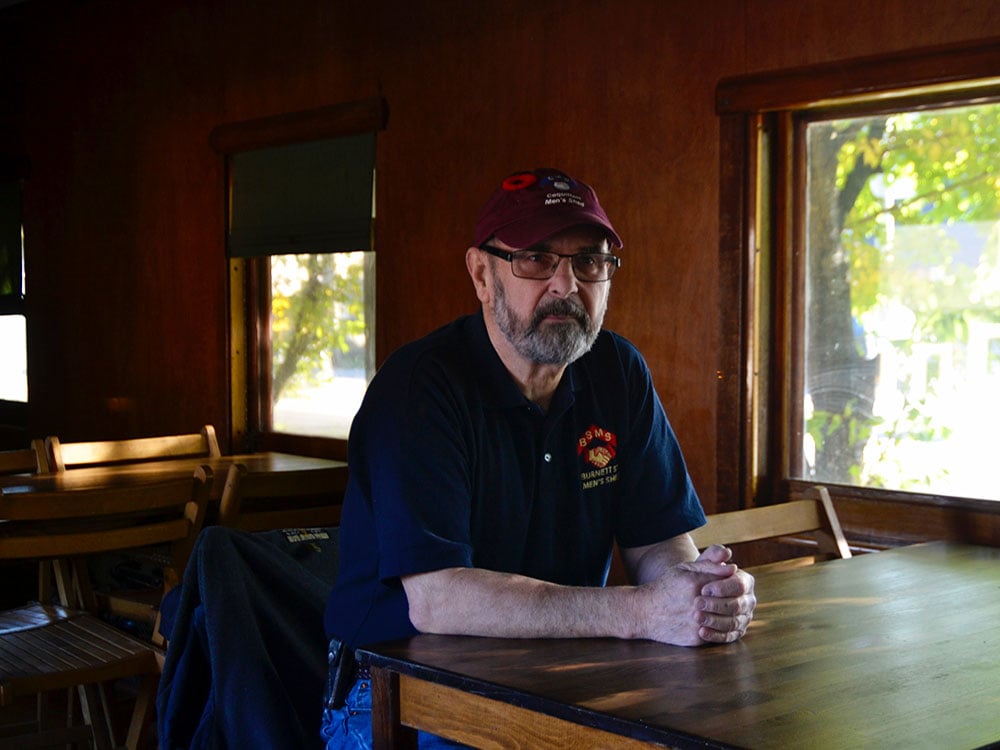The shed is tucked away at the end of a cul-de-sac in a residential neighbourhood. It’s about six metres high with dark blue panels on its side and a red cursive sign hanging from the roof that reads “Coquitlam Men’s Shed.”
Outside, you can hear cars zooming by on Lougheed Highway. Inside, there are tools on the wall, saws on wheels, measuring sticks, and six men chatting around a workshop. Sitting in the back right corner of the workshop is Cal Smith. At 64, he’s the youngest member of the 35-member club.
“He’s not 65, if you can believe it,” says Doug Gale, one of the founding members of the Coquitlam shed. “He has quite a bit of energy.”
Each person in this shed has their own unique qualities. While Gale brings lightheartedness to their weekly meetups, Smith is a calming presence who makes members feel at ease.
Smith found himself here because he had a plan. But not every man has this foresight as they approach retirement.
A study conducted earlier this year in Europe found that social isolation was a key predictor for depression among older adults.
Smith knows that life well from his 16 years of work as a longshoreman in Vancouver. He worked seven days a week in an immersive environment that was a world unto itself, and did everything from operating cranes to driving large machinery. Smith’s life was consumed with his intensive work schedule and the income it promised — he had space in his life for little else.
“All longshoremen think about is how much money they’re going to make,” Smith said. “That’s the most important thing, so we don’t take time off.”
He knew he would fall out of touch with his dock workmates once he retired. So during his final year working as a longshoreman in 2021, he decided to do something about it.
“I knew I needed a new group of guys to hang out with and this is what it has turned out to be for me,” Smith said. “A new family.”
Feeling lost
It’s no secret that men struggle to talk about their feelings.
Due to stigma and cultural norms, men often hide their vulnerabilities to not appear mentally unstable or weak.
A 2019 study from Movember found that one third of men felt pressure to be “manly,” while a survey published last month found that nearly half of working-age men in Canada met the criteria for being clinically depressed.
Although this stigma may be prevalent for men of all ages and backgrounds, experts say that senior men are at an even higher risk of developing mental health challenges.
The U.S. Centers for Disease Control and Prevention reported that health complications and misdiagnoses are the two main culprits for depression among older adults. Specifically, the organization noted, health-care providers might overlook an elder adult’s symptoms of depression as a reaction to an illness or aging.
According to a 2015 report from the American Psychological Association, men over the age of 85 had the highest suicide rate for any age demographic in the U.S.
Dr. Marnin Heisel, a clinical psychologist and professor at Western University’s department of psychiatry and department of epidemiology and biostatistics, says that there are a number of factors that contribute to a high rate of depression and suicide among senior men.
For starters, he says that North American societies often ignore older adults. This leads to them feeling less a part of society as they age. There is also less research on the mechanisms that can improve their mental health.
“North Americans, [westerners] are very focused on development, on youth, advancement and innovation,” Heisel said. “Which is funny because older people can be highly innovative and bring a lifetime of experience, but as a society, we are not very good in terms of honouring our seniors.”
Heisel adds that the pre- and post-retirement phase can be particularly difficult for men. Especially for men who grew up believing they had to support their families.
When they stop working, many start to question their identity.
“For those who have been socialized, as many men and many generations of men have been, where your role is to go out and get a job to earn for your family, when you’re not doing that, what are you there for?” Dr. Heisel said.
“So many people feel they’re just sort of lost.”

A place to belong
Men’s Shed originated in Australia in the 1990s as a way to combat those feelings of loneliness older men experience.
The first shed was opened in 1993 by Maxine Chaseling. Her father started to become depressed after a heart attack limited him from working, and she noticed his only source of happiness was being in his toolshed.
Chaseling spoke at conferences throughout the rest of the decade, and in 1995 the Australian government held a conference to figure out ways to improve men’s health and reduce depression risks for older men.
After the conference, the first official Men’s Shed opened in 1998 and they began popping up across the country.
They were created for men — young and old — to work on projects and sit and talk. However, Men’s Sheds largely consist of elderly men.
There are now 1,200 sheds in Australia that bring together over 50,000 men. The members organize a weekly meetup spot for lunch and then head to their respective shed to work on a project.
The movement has also spread to 12 countries across the world, including the United Kingdom, New Zealand and Canada.
The first Canadian shed was founded in Winnipeg in 2011. Doug Mackie, the founder of Men’s Shed Canada, saw it as an opportunity to bring together men in his community who felt lonely and isolated.
Mike Jennings, president of the Men’s Shed Association of BC, started laying the groundwork for a Men’s Shed in Coquitlam in 2015 after hearing about the movement in Winnipeg.
At the time, Jennings had recently received an offer to buy the small wood-chipping business he’d been running for 20 years. Like Smith, he recognized the importance of staying proactive with his mental health.
“Everything I did was based around the business. I’m a single guy, live alone in a small apartment,” Jennings, 78, said. “I knew that once I sold my business, I’d stay in the apartment and would be punching the walls. It was unthinkable.”
After he officially sold his business, he solidified the group, which initially consisted of friends he’d had for years.
They started meeting for regular weekly lunches and devised woodworking projects in Coquitlam’s Blue Mountain Park. The group stayed there until 2019, when they moved into their shed just off Lougheed Highway.
As president, Jennings helps other B.C. sheds acquire supplies for their respective projects and spread the Men’s Shed movement to other communities.
In 2017, he registered to make the Men’s Shed Association of BC a non-profit organization. There are now 23 sheds in B.C. from Vanderhoof to Vancouver.
More than a hobby
During the pandemic, Cam Pearson, a co-ordinator at the Mount Pleasant Neighbourhood House, said they noticed a dip in senior men participating in social activities.
Although the neighbourhood house has always struggled to attract men to their programs, Pearson said participation dropped by a third to one half of all men. He estimated that the drop was a combination of pandemic-related fears and a reduction in the club’s programming.
As the pandemic dragged on, the social service organization felt it was necessary to start a Men’s Shed. They recognized that men might be less likely to reach out and wanted to attract men who may be longing for social interaction.
“We would basically be like, ‘Do you want to join a weekly meeting?’ And we just started organizing weekly meetings,” Pearson said. “But quickly, it turned into a group where we were creating this Men’s Shed.”
The Mount Pleasant shed has a core of six members who meet weekly at the neighbourhood house. The group has built various structures — a mobile little library, daycare furniture, and a chess table for a public plaza — that give back to the community.
Pearson said the shed gives the men routine and a sense of structure.
“It gives them specific projects that they can work on,” he said. “Thinking through a project like, ‘What steps do we need? What materials do we need?’... Really scratches their itch in that respect because they had professions where they were previously doing that planning work.”
Dave Querbach, a member of the Coquitlam and Port Moody Men’s Sheds, says Men’s Sheds attract men who might not be interested in the type of activities that are normally part of senior’s homes.
“My wife drags me out to dance at a senior’s centre, [but] I wouldn’t cross the street for it,” he says.
For Querbach, Men’s Sheds give him a sense of camaraderie.
Each shed acts independently of one another and receives community projects mainly through word of mouth.
In 2019, for example, members of the Coquitlam shed built over 50 birdhouse frames for students at Edith Cavell Elementary School in Vancouver. A member’s daughter taught at the school and asked the men if they could make parts of a birdhouse that they could help students put together themselves.
“Each table had a [Men’s Shed member],” Gale said. “They were absolutely enthralled.”

Working shoulder to shoulder
The over-85 age group is one of the fastest-growing populations in the country.
There were over 861,000 people aged 85 and older counted in the 2021 census, double the amount that was tracked in 2001.
As people start to live longer, community-focused initiatives will be crucial to ensure elderly men are not disproportionately impacted by mental health challenges.
Heisel said that we as a society need to change our attitudes towards older people. He would like to see more education about the importance of supporting older adults in schools, and programs that involve elders in activities such as daycare.
Expanding grandparent programs would also foster relationships between younger people and elders while simultaneously giving older people a sense of belonging “rather than saying, when somebody reaches a certain age, it’s time for them to leave their homes and move into a facility. That’s where they’ll be forgotten,” Heisel said.
“‘Grandparenting’ programs, where older adults help with either after-school care, taking kids to school.... That’s a really nice combination of having young people connecting with older people.”
Pearson has observed senior men experiencing homelessness and precarious housing situations. He wishes there was more housing designated for older men, and that there was funding to support non-English speaking social support groups.
“There’s a lot of Chinese- and Spanish-speaking seniors in the community that I can’t reach out to,” Pearson said. “Certainly newcomers and newcomer seniors have challenges trying to find a sense of community and finding people who know about various services.”
The need for culturally appropriate support for immigrant and racialized seniors is well-documented across the Metro Vancouver region.
Outside of Metro Vancouver, LOVE CRN, a Vancouver Island-based advocacy organization, is addressing elder abuse among queer communities throughout Vancouver Island and the Gulf Islands.
Jennings, the president of the Men’s Shed Association of BC, would like to see the number of sheds in B.C. expand to 40.
He acknowledges that elderly men are the backbone of all sheds, however, like Heisel and Pearson suggest, he encourages people of all backgrounds to join a shed.
As a single, twice-divorced man who’s currently living alone, he doesn’t feel isolated thanks to the shed.
“In the shed, there’s an expression that a lot of people use which is ‘working shoulder to shoulder, men will speak to one another,’” Jennings said. “That’s certainly been my experience.”
In November 2019, for instance, Jennings admitted to his Men’s Shed colleagues that he needed coronary bypass surgery.
The news had shocked him. As far as he was concerned he was “as healthy as an ox.”
But one week later, at his Coquitlam group’s lunch, his friends surprised him by bringing a heart expert to talk to the group about what Jennings could expect.
“‘We’re here for you,’” Jennings remembers the group saying.
“That’s the kind of thing that happens in a shed.” ![]()
Read more: Health, Gender + Sexuality
















Tyee Commenting Guidelines
Comments that violate guidelines risk being deleted, and violations may result in a temporary or permanent user ban. Maintain the spirit of good conversation to stay in the discussion.
*Please note The Tyee is not a forum for spreading misinformation about COVID-19, denying its existence or minimizing its risk to public health.
Do:
Do not: